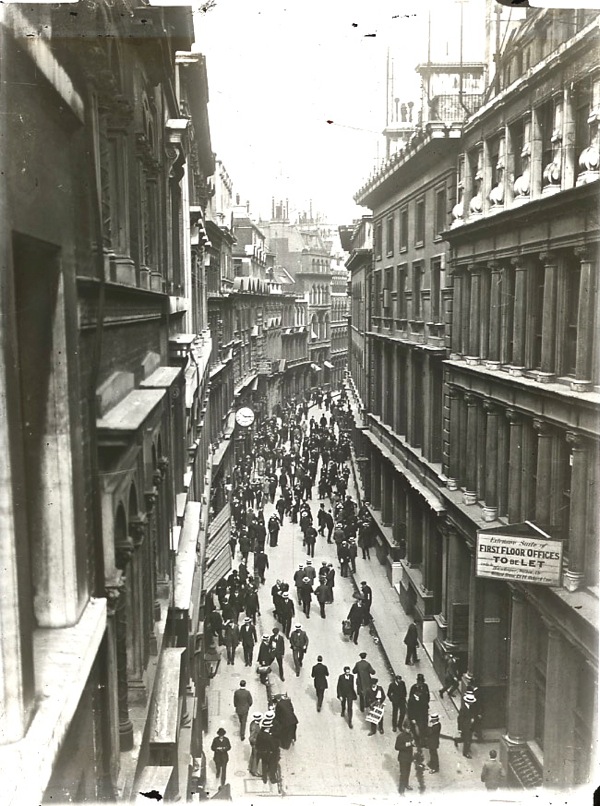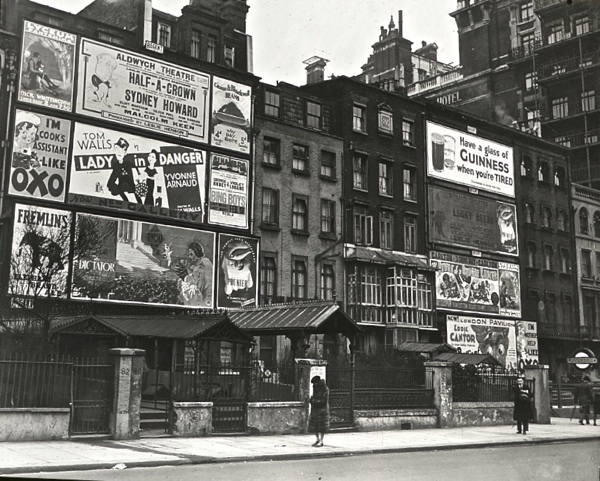The Streets of Old London
Piccadilly, c. 1900
In my mind, I live in old London as much as I live in the contemporary London of here and now. Maybe I have spent too much time looking at photographs of old London – such as these glass slides once used for magic lantern shows by the London & Middlesex Archaeological Society at the Bishopsgate Institute?
Old London exists to me through photography almost as vividly as if I had actual memory of a century ago. Consequently, when I walk through the streets of London today, I am especially aware of the locations that have changed little over this time. And, in my mind’s eye, these streets of old London are peopled by the inhabitants of the photographs.
Yet I am not haunted by the past, rather it is as if we Londoners in the insubstantial present are the fleeting spirits while – thanks to photography – those people of a century ago occupy these streets of old London eternally. The pictures have frozen their world forever and, walking in these same streets today, my experience can sometimes be akin to that of a visitor exploring the backlot of a film studio long after the actors have gone.
I recall my terror at the incomprehensible nature of London when I first visited the great metropolis from my small city in the provinces. But now I have lived here long enough to have lost that diabolic London I first encountered in which many of the great buildings were black, still coated with soot from the days of coal fires.
Reaching beyond my limited period of residence in the capital, these photographs of the streets of old London reveal a deeper perspective in time, setting my own experience in proportion and allowing me to feel part of the continuum of the ever-changing city.
Ludgate Hill, c. 1920
Holborn Viaduct, c. 1910
Woman selling fish from a barrel, c. 1910
Trinity Almshouses, Mile End Rd, c. 1920
Throgmorton St, c. 1920
Highgate Forge, Highgate High St, 1900
Bangor St, Kensington, c. 1900
Ludgate Hill, c. 1910
Walls Ice Cream Vendor, c. 1920
Ludgate Hill, c. 1910
Strand Yard, Highgate, 1900
 Eyre St Hill, Little Italy, c. 1890
Eyre St Hill, Little Italy, c. 1890
Muffin man, c. 1910
Seven Dials, c. 19o0
Fetter Lane, c. 1910
Piccadilly Circus, c. 1900
St Clement Danes, c. 1910
Hoardings in Knightsbridge, c. 1935
Wych St, c.1890
Dustcart, c. 1910
At the foot of the Monument, c. 1900
 Pageantmaster Court, Ludgate Hill, c. 1930
Pageantmaster Court, Ludgate Hill, c. 1930
Holborn Circus, 1910
Cheapside, 1890
Cheapside ,1892
Cheapside with St Mary Le Bow, 1910
Regent St, 1900
Glass slides copyright © Bishopsgate Institute
You may also like to take a look at









































this really is more the london of blake, johnson, and dickens than it is ours. i thought i saw virginia woolf hiking over the ludgate hill pedestrian overpass. it seems terrible that that world, which was more like the previous 1,000, should have disappeared in 100 years. thanks for these pictures, i love the crowds and the vistas and the garbage and the ancient sagging buildings.
These are incredible. Thank you.
I especially like the one on an unknown street c. 1890. The stories skulking about…
Those unknown streets – one is in Little Italy and is still there and the other is near Old Bailey but I think that may have gone in redevelopment. I think the Little Italy is Summer Street, or
something of that ilk. The buildings at the bottom of the street have gone but the perspective is the same.
Happy wanderings!
Oh these are marvellous! Thank you.
More magical frozen moments, and the Gentle Author’s words so much how I also feel about the London I live in and its ghosts.
Here another photograph of hoardings covering windows. I wish I knew more about this. I wonder how common it was? When did it stop happening? Was it banned? But most of all whatever was in like in the always-dark rooms behind the hoardings?
More wonderful images and such an evocative introduction.
A terrific set of photos. Your unknown street is a view from Pageantmaster Court looking across Ludgate Hill to the Old Bailey. The building in shadow to the immediate right is still standing but virtually everything else is now gone.
A photo of the muffin man! How wonderful. As children we used to sing a very simple song about a muffin man who lived in Drury Lane. Do you know it?
I could look at these old photos all day. They are wonderful glimpses into a vaguely familiar past.
Fabulous pictures which are not staged and stereotyped like many old ones. Remembering London from the 50s and 60s I can see the link back to that time. But London has always changed and if we could go back another 100 years we would see all the medieval buildings that were torn down by the Victorians. It looks romantic but there’s an awful lot of poverty when you look closely.
The Walls ice cream man was still around when I was a child in the 1930’s. He rang his bicycle bell and called “Walls’s they’re lovely” A 4 inch long triangular fruity ice cream in a paper wrapper cost one penny, or he would cut it in half for a halfpenny. He had a competitor the Elderado ice cream man, but he only sold cornets.
Gary
So much for the ‘good old days’ . . . actually these images are quite depressing . . . happy to be living in the here and now . . .
Wondering where the stray dogs are in those photographs? So many artistic impressions of London streets show dogs wandering or running about… it seems not so in reality!
This has always been an astonishing website, but you’ve absolutely excelled yourself this time. Time until the Retronaut pinches your pics 5..4…3.. 2.. etc, but truly wonderful.
Really wonderful glass plates. I am always astonished at the quality of the pictures.
Wonderful images. Keep up the good work!
Fantastic images. Oh for a time machine.
I love the old pictures. My grandmother and grandfather were living in England
at that time. These are just fascinating! Thank you for sharing. From Virginia, US
Fantastic photos. the lost characters of London….
Brilliant,didn’t want them to end.
I am compiling a huge research project – Literary Atlas of Great Britain , including etchings, lithographs, and old photos of topographical sites associated with writers. Could I use selected photos from your glass slides collection with full appropriate credit of course. This project is unfunded- simply a labour of love by a former English resident, following completion of a DPh. Thank you… David Ford.
What a fabulous site with wonderful pictures. I have lived in Australia for the past forty years, but still visit London in my mind and via google earth.
When I first started work in 1948, it was as an office boy with a booksellers in Friar Street, Carter Lane – within sound of the (discordant) clock chimes of St Paul’s. Part of my duties was to collect books from Publishers, this involved travelling around London by bus, underground and shanks’ pony. Consequently I came to know it quite well, but it was very different to the photos on your site – courtesy of Hitler’s Luftwaffe. In my memory Ludgate Hill was wider than shown in the photos, but The King Lud still ruled Ludgate Circus. Although there were many bomb sites, the City of London was full of interest and magical history – especially when I was taught to look up and see what was on the upper facades of buildings.
In the mid 50s I worked in St. John St and would cycle to work each day. My route would include – Elephant & Castle; Lambeth Walk; Aldwych; Fleet Street; Holborn Viaduct; Old Bailey; St. Bart’s and Smithfield to name a few landmarks.
Thank you for your site, I love London as you do and appreciate the web sites which provide such interesting historical information.
Charles.
St. Clement Danes c1910 is actually St. Mary-le-Strand on the Strand: https://www.flickr.com/photos/46317563@N04/14212098873/
These are wonderful pictures and memories of how London was in 1910.
Thanks for these photos as it enables me to see what the area my ancestors lived in looked like in their time. Also do you have any photos of their street? The 1901 census shows them living on Swinbrook Road in North Kensington. I’ve done a Google search and can’t find much.
Thank you very much for all the information, really enjoyed reading it. I found it most interesting as I have researched all my ancestors and one was born in Spitalfields.
Thanks again for sharing these. As another commentator said, I could look at these for hours.
These are remarkable photographs, can study them for hours. I worked in the City for many years and particularly remember the old Leadenhall Market before it all changed. My family had their roots in Spitafields, and some were there until the 1980s. Not only are they interesting photographs but they also make me feel very nostalgic for the life that was there once. Thank You.
Well after a wonderfull study of these photos, I must now ask the OBVIOUS question, are there any copies available for sale?
Kind Regards
C.Stewart
My dad lived in Bangor Street.
I am looking for information on Manny Hertzberg selling ice cream in the est end in the 1940”s
Any information from anyone?????
Fantastic images. One question, though, is the image of the fish seller an image of London?
These are excellent. Do you have anything on the Smithfield market? I once worked there.
Regards,